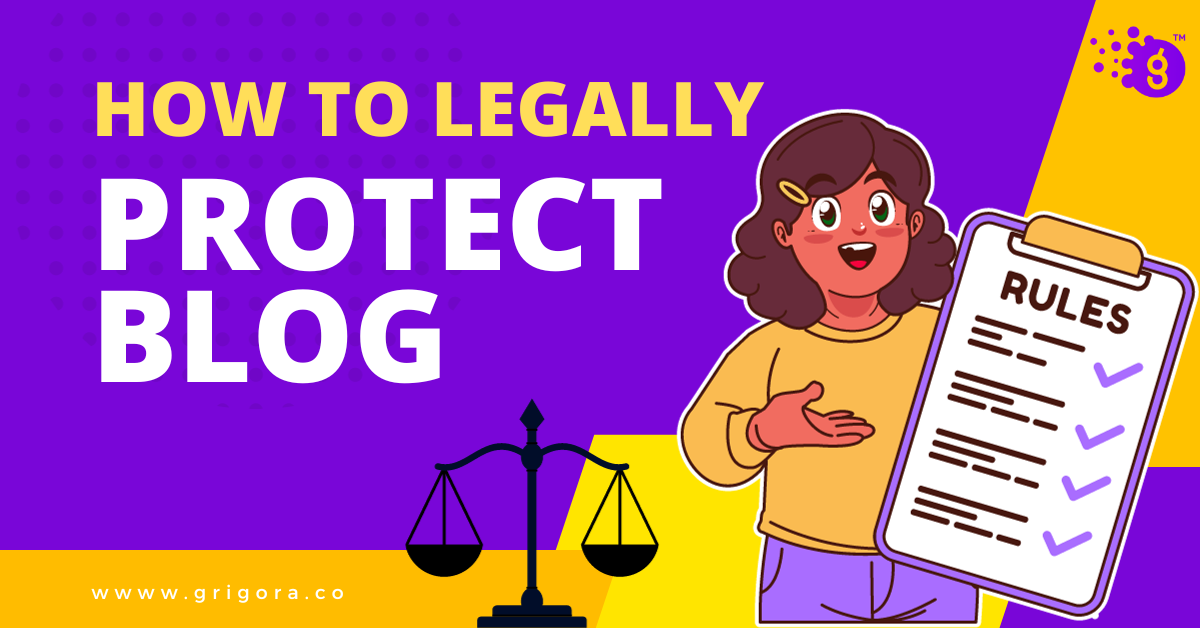Understanding Legal Protection: Safeguarding Your Blog
Ignorance of the law is no excuse in any country. If it were, the laws would lose their effect, because it can always be pretended.
Thomas Jefferson
Why Legal Protection Matters
Legal protection is not just a formality; it's a necessity for bloggers. The digital landscape is fraught with risks like copyright infringement, data breaches, and defamation. Failing to take legal precautions can result in lawsuits, financial losses, and damage to your reputation. Therefore, understanding and implementing legal safeguards is crucial for the longevity and credibility of your blog.
What This Guide Covers
This guide aims to provide a comprehensive overview of the legal aspects you need to consider for your blog. We'll delve into topics such as copyright laws, trademarks, privacy policies, terms and conditions, disclaimers, and data protection regulations like GDPR and CCPA. By the end of this guide, you'll have a solid foundation to legally protect your blog.
Copyright Laws: Protecting Your Content
Understanding Copyright
Copyright is the legal right that grants the creator of original work exclusive rights to its use and distribution. This means that the content you create for your blog—be it text, images, or videos—is automatically copyrighted to you. However, this doesn't prevent others from infringing upon your rights, which is why taking additional steps to secure your copyright is advisable.
How to Register a Copyright
Registering a copyright provides a public record of your copyright and is often necessary if you wish to bring a lawsuit for infringement in the U.S. The process involves submitting an application to the U.S. Copyright Office, either online or through mail, along with a copy of the work you want to protect and a registration fee. The act of registering amplifies your protection, allowing you to claim statutory damages and attorney's fees in legal disputes.
Trademark: Branding and Identity
What is a Trademark?
A trademark is a symbol, word, or phrase that identifies and distinguishes the source of goods or services. For bloggers, this could be your blog's name, logo, or even a specific catchphrase you use frequently. Trademarks are crucial for establishing your brand's identity and preventing others from creating confusion between their brand and yours.
Registering a Trademark
Registering a trademark involves filing an application with the United States Patent and Trademark Office (USPTO) or the corresponding office in your country. The application will require details like the name/logo you want to trademark, the goods/services it will represent, and a specimen showing the trademark as used in commerce. Once registered, a trademark offers exclusive rights to use the mark on your class of goods or services and allows you to take legal action against unauthorized uses.
Privacy Policies: Protecting User Data
Why Privacy Policies are Necessary
In today's digital age, data is often considered the new oil. As a blogger, you'll likely collect some form of user data, whether it's email addresses for a newsletter or analytics to understand your audience better. Having a privacy policy isn't just good practice; it's often legally required. This document informs your visitors what data you collect, how you use it, and how it's protected.
Creating a Privacy Policy
Creating a privacy policy is more straightforward than you might think. Many online generators can help you draft one, but it's always best to consult with a legal advisor to ensure it meets all legal requirements. Your privacy policy should include sections on the types of data collected, the purpose of data collection, how data is stored and protected, and how users can opt out. Make sure to place your privacy policy in a visible location on your blog, usually in the footer.
Privacy Policies: Safeguarding User Information
Why Privacy Policies are Crucial
Privacy policies are not just a legal formality but a crucial element for any blog. They serve as a contract between you and your readers, outlining how their data will be used and protected. In many jurisdictions, having a privacy policy is a legal requirement, especially if you collect personal information from your visitors.
Crafting a Privacy Policy
Creating a privacy policy is not as daunting as it may seem. While there are online generators that can help you draft one, consulting with a legal advisor ensures that you meet all legal obligations. Your privacy policy should clearly state what kind of data you collect, why you collect it, how you store it, and how you protect it. Make this document easily accessible, typically in the footer of your blog, so that visitors can review it at any time.
Terms and Conditions: Establishing the Ground Rules
Why Terms and Conditions are Important
Terms and Conditions serve as a legal agreement between you and your blog's visitors. They set the rules and guidelines that users must agree to in order to use your blog. Having a well-drafted Terms and Conditions page can help you limit your liability and protect your rights to the content you publish.
Drafting Your Terms and Conditions
Creating Terms and Conditions may require some legal expertise, but there are also online templates available as a starting point. The document should cover key areas such as user behavior expectations, copyright and trademark policies, and disclaimers. It's advisable to consult a legal advisor to ensure that your Terms and Conditions are comprehensive and comply with relevant laws.
Disclaimers: Limiting Your Liability
What is a Disclaimer?
A disclaimer is a statement that aims to limit an entity's legal liability. For bloggers, this is crucial because it specifies the boundaries of your responsibilities and what you can and cannot be held accountable for. For example, if you're giving advice on your blog, a disclaimer can protect you from legal repercussions if someone misinterprets or misuses your information.
Types of Disclaimers
There are various types of disclaimers that can be applicable depending on the nature of your blog. Common types include general disclaimers, medical disclaimers, and affiliate disclaimers. Each serves a specific purpose and should be crafted carefully to suit your blog's content.
Data Protection: Navigating GDPR and CCPA

Understanding GDPR and CCPA
The General Data Protection Regulation (GDPR) and the California Consumer Privacy Act (CCPA) are legal frameworks that dictate how personal data should be handled. GDPR is applicable in the European Union, but it affects you if you have EU visitors. Similarly, CCPA is a California law but applies if you have visitors from California.
Steps for Compliance
Compliance with these laws is not just ethical but mandatory to avoid hefty fines. Here are some steps for compliance:
Conduct a Data Audit: Know what data you're collecting and why.
Update or Create Privacy Policy: Your privacy policy should be in compliance with GDPR and CCPA guidelines.
Implement Opt-In/Opt-Out Options: Allow users to opt-in or opt-out of data collection.
Data Encryption: Use secure methods to store sensitive data.
Legal Consultation: Knowing When to Seek Professional Help
When to Consult a Lawyer
Legal intricacies can be complex and ever-changing. While online resources are helpful, they can't replace professional advice. Consulting a lawyer becomes crucial when:
You're drafting complex legal documents: Such as contracts or terms and conditions.
Facing Legal Action: If someone threatens to sue you or you need to take legal action against someone else.
Business Structure Changes: If you're turning your blog into a business, legal advice is invaluable.
Choosing a Legal Advisor
Selecting the right legal advisor is a critical step. Here are some tips:
Specialization: Choose a lawyer who specializes in internet law.
Experience: Look for someone with experience in your blog's niche.
Consult Reviews and Testimonials: What do other clients have to say?
Cost: Make sure their fees are within your budget.
Frequently Asked Questions
Navigating the legal aspects of blogging can often raise a lot of questions. Here, we address some of the most common concerns.
What are the basic legal requirements for starting a blog?
The foundation of any blog should include a privacy policy, terms and conditions, and a disclaimer. Depending on your content, you may also need to consider copyright and trademark laws.
How do I protect my blog from copyright infringement?
Protection against copyright infringement isn't just about safeguarding your own content; it's also about ensuring you're not infringing on others' rights. Registering your content with the U.S. Copyright Office or your country's equivalent can offer an additional layer of protection. Watermarks and digital rights management tools can also be beneficial.
What is the difference between a privacy policy and terms and conditions?
While both are legal documents, they serve different purposes. A privacy policy is designed to inform visitors how their personal data will be used and protected. Terms and conditions, on the other hand, outline the rules and guidelines for using your website.
Do I need to comply with GDPR if my blog is not based in the EU?
If your blog attracts visitors from the European Union, then yes, you need to be GDPR compliant. This holds true regardless of where your blog is physically located.
How often should I update my legal documents?
It's a good practice to review and, if necessary, update your legal documents at least once a year. However, significant changes in your blog's structure or content, as well as updates to relevant laws, may require more frequent updates.
Conclusion
Safeguarding Your Blog's Future
In the digital age, where content is easily accessible and shareable, taking the necessary legal steps to protect your blog is not just advisable—it's essential. From understanding the basics of copyright and trademark laws to ensuring compliance with data protection regulations, each aspect serves to shield you from potential legal pitfalls.
This guide has aimed to provide you with a comprehensive overview of the legal considerations you should be aware of as a blogger. Whether you're just starting out or looking to fortify an existing blog, these guidelines offer a roadmap to navigate the complex legal landscape.
Remember, while this guide offers a strong foundation, it's always a good idea to consult with legal professionals for advice tailored to your specific needs. After all, the best defense is a good offense.



